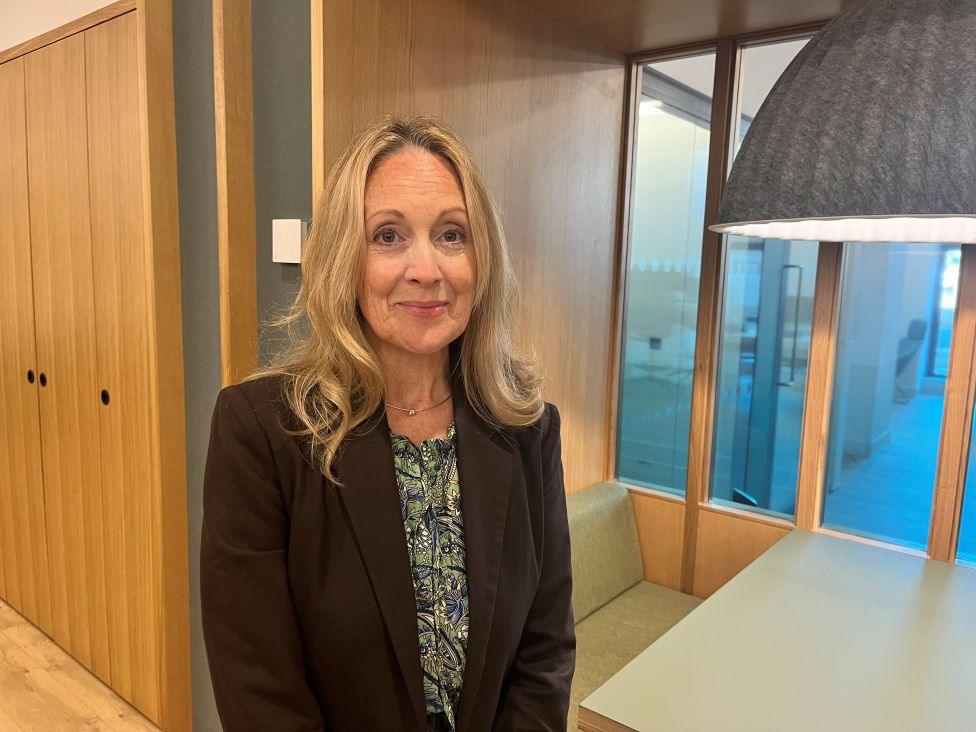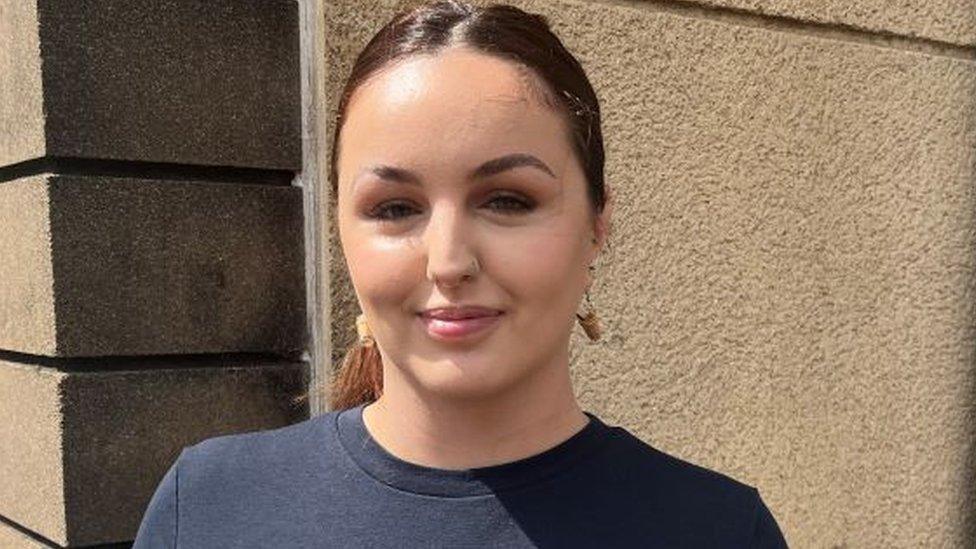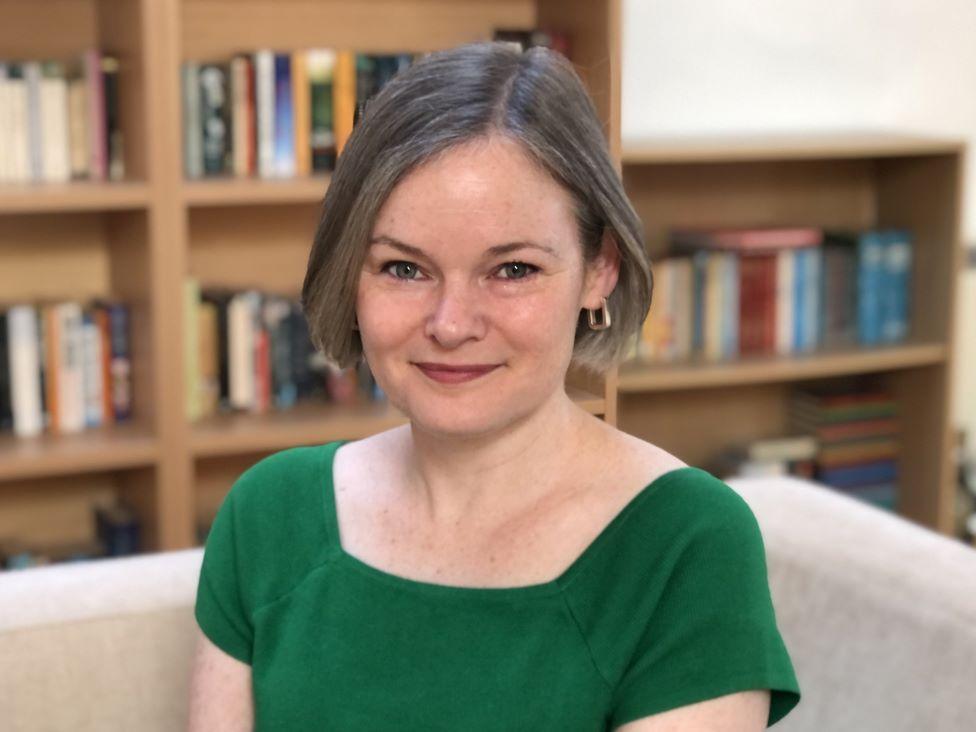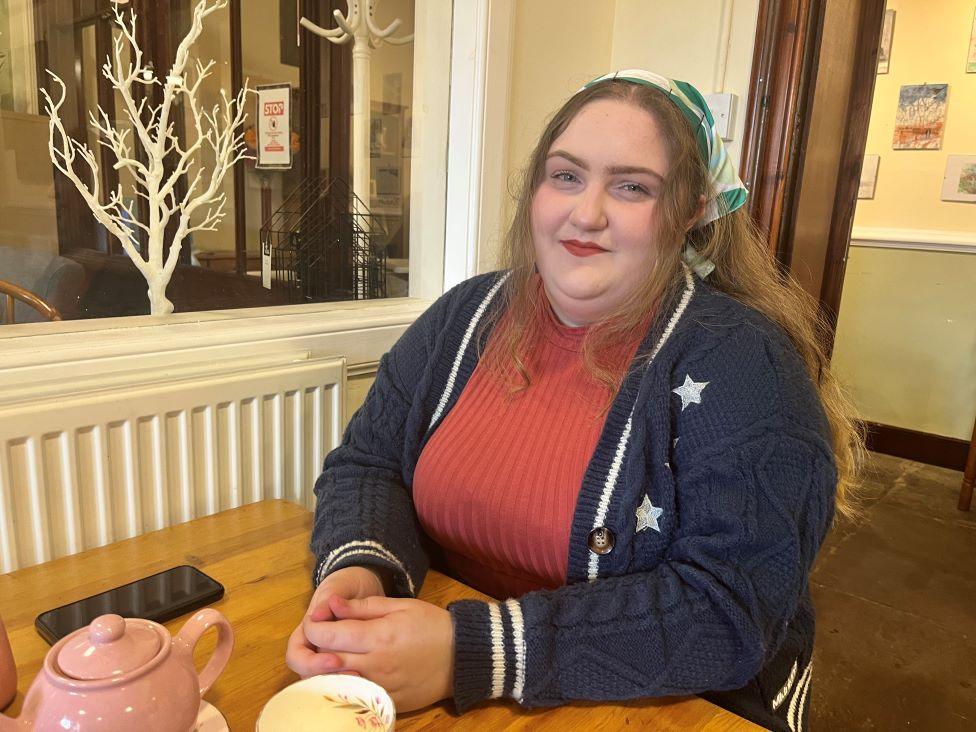How money worries are putting young dreams on hold
- Published

Casey, Rhianna and Amy reflect on what they would like to do for a living
Teenagers leaving school are seeking stability rather than chasing their dreams due to anxiety about the cost of living crisis, experts have said.
Career advisors say money worries are having an impact on young people's job plans, with many taking up "stopgap jobs" to pay the bills.
In Whitlawburn Community Resource Centre in Cambuslang, Casey, Rhianna and Amy play pool and reflect on what they would like to do for a living.
Sixteen-year-old Casey is currently waitressing while she waits to start a Working with Communities college course next month.
"I really need to get another job to help me out and obviously help my mum out", she says.

Casey would like to get into youth work
Casey would like to get into youth work after volunteering with South Lanarkshire charity Regen:FX.
Eventually, she plans to move into the mental health sector but worries about how viable a career it would be.
"Youth work isn't really a stable job for finance," she says.
"I feel like in the future when I'm doing it, I will need to get a side-job that will bring more income."

Rhianna has ambitions to get into childcare
Rhianna has ambitions to get into childcare.
"I've got into college but I would rather do an apprenticeship just to get the money to help out and stuff," she says.
The 16-year-old feels nervous about standing on her own two feet.
"You don't know how much everything's going to go up," she says.
"When we move out, is it going to be triple how much it is now?"
Long-term options
Amy, who is now 18, moved out of her family home two years ago and says she can't afford to study full-time.
"I do want to go get qualifications but it's the money holding me back," she says.
The 18-year-old receives universal credit which would be reduced if she received a bursary.
"Sticking into college is kind of hard because if I apply for a bursary, I can't afford to keep the house. I won't get my rent paid," she says.
"You've always got to have money to make it so you need to start somewhere to finish somewhere higher up."
Amy will soon be starting a part-time course in beauty to keep her busy while she considers her long-term options.
Eventually, she'd like to travel abroad to help others.
"I want to help kids across the world that don't have what we have," she says.
"We get our free education and other kids aren't so lucky to get that."

Sharon McIntyre is keen to emphasise that free support and advice is available
Career advisors at Skills Development Scotland say they are seeing the direct impact of the cost of living crisis on young people.
"In areas where households are struggling, we're seeing a lot more young people go straight into employment rather than further education or higher education," says Sharon McIntyre, the body's head of careers, information, advice and guidance.
"We're seeing a bit more of a need for stability rather than big ambition because of some of the struggles they're seeing at home," she says.
"I think those impacts are absolutely being felt."
Despite the extra challenges around finances, the skills agency is keen to emphasise that free support and advice is available.
"Our message to young people is believe in yourself and we are here to support you reach that ambition."

Charlotte Liddell is preparing to start an online criminology degree
In Leven library in Fife, 26-year-old Charlotte Liddell is preparing to start an online criminology degree.
The single mum-of-two says the cost of childcare and the cost of travelling was the main reason for doing the university course online.
She adds: "If I did have to move to where I wanted to go, it would have cost far too much.
"It's really hard doing an online course because you do not get the same face-to-face interactions.
"I didn't think I would ever get to university, leaving school with no qualifications, so university life is something that I've always kind of dreamed of. It's sad that I won't get the life that I thought I was going to have at university."
Same position
Charlotte feels motivated to follow her dreams after her father recently died.
"I realised that life is not always guaranteed because he was only 55 years old," she says.
"I wanted to do something that I'm passionate about."
"I could easily get a job just now, but I'm just going to be stuck in the same position.
"I feel like the four-year online course is going to benefit me in the long-run because I'll have a better paid job at the end, hopefully."
At the heart of all her decisions are her children aged eight and 10.
"Hopefully the effort that I'm doing just now is going to mitigate some issues that they'll have when they're older," she says.
"I'm hoping that I'll be able to help them with their first car and take them on their first holiday and things like that."

Lorna Dargan says some students are taking a "stopgap" job to help them to pay the bills
Advisers supporting students at a university level get into employment say they are also seeing an impact from the cost of living.
"Students are still really ambitious," says Lorna Dargan, vice president at the Association of Graduate Careers Advisory Service.
"Some of our students are taking what we would call a 'stopgap' job - so any job that would help them to pay the bills - because sometimes there can be a little bit of a delay between graduating and getting that kind of graduate job," she says.
"A stopgap job doesn't have to be forever and it's not necessarily a detriment to you going on to get the job that you want."

Erin Waldie has only worked in a takeaway since graduating
In Dundee, Erin Waldie has a new degree in international relations and politics - but has only worked in a takeaway since graduating.
"You kind of get stuck in hospitality for a bit because that's the only experience you have", she says.
"Then when you're applying for jobs that are diplomacy or politics, you can't - you don't have the experience."
Erin, originally from Edinburgh, would like to work for the UN one day.
"UN women - that's the big dream," she says.
The 21-year-old says the financial climate means a career in international diplomacy isn't viable with the cost of extra training and travel that would be needed.
"It's very nerve-wracking," she says.
"I have all these big dreams, but I feel like they're being put a stop to.
"I have to stop and think about what exactly I'm going to do to be able to achieve those dreams.
"It's disrupted a lot of plans that I've had since I was young."